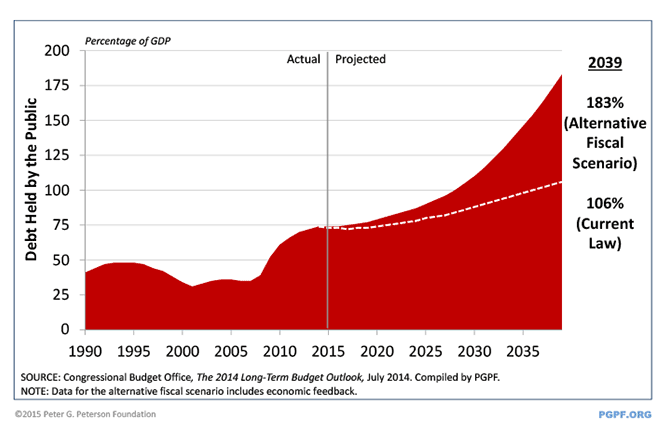The new Republican majority in Congress is gearing up for what’s sure to be a bruising and contentious spending battle this year, beginning with the unveiling of the House and Senate Budget Committee’s GOP blueprint this week.
Committee chair Sen. Mike Enzi (R-WY) and his House counterpart, Rep. Tom Price (R-GA), are committed to putting the government on a 10-year glide path to a balanced budget. That could put them, however, on a collision course with conservatives in their own party as well as with Democrats who oppose sharp cuts in domestic programs. All of this comes at a time when the economy has been on the upturn and the budget deficit has been tamed for the time being.
Related: How Many Agencies Does It Take to Change a Lightbulb?
Republicans appear determined to cut spending on such programs as Medicaid and food stamps by converting the social safety net programs to block grants to the states. The GOP has attempted these and other measures before only to encounter opposition from the Democrats and President Obama.
This year should be no different.
Sen. Bernie Sanders (I-VT), the ranking member of the Senate Budget Committee, on Sunday urged the GOP to work with him and congressional Democrats on a budget that “represents the needs of the American middle class and not just the wealthiest and most powerful people.”
Sanders, a far-left leading spokesperson for the Democrats on the committee, said top priorities should include rebuilding infrastructure, addressing student debt, raising the minimum wage, reforming the tax code and preventing cuts to Social Security and Medicare.
Related: Social Security Cheats Bilk Taxpayers in the Billions
“I hope very much my Republican colleagues will not release a document that stands for the Robin Hood principle in reverse,” he said. He added that Democrats would not go along with block granting Medicaid and food stamps and “mindless austerity” by preserving spending cuts in domestic and military programs.

There are dozens of technical issues to be resolved around spending and tax revenue projections that may be baffling to the average American. But these would have an enormous impact on the ultimate success or failure of the GOP fiscal strategy.
President Obama in early February unveiled a $4 trillion budget plan. It would lift spending caps and raise taxes to make way for major increases in programs and tax breaks for the middle class, increased defense spending, and other initiatives that would add $6 trillion to the national debt in the coming decade.
Much of what he proposed was dismissed as “wishful thinking” or “dead on arrival” on Capitol Hill. Now it is the Republicans' turn to put down their budget markers and see how far they can get with it – in both dealing with the White House and Democrats and reconciling feuding elements of their own party.
Related: 106 Radical Ways to Slash and Burn the Federal Budget
While there are scores of issues to be resolved, probably the most important issue will be whether to stick with statutory spending caps or scrap them.
President Obama has proposed lifting domestic spending and defense appropriations caps imposed by the 2011 Budget Control Act. Doing so would boost spending on defense and key domestic programs – and many conservative defense hawks on Capitol Hill agree with him that restrictions on defense spending should be scrapped to beef up the military and wage war against terrorist threats.
Indeed, the chairs of the Senate and House Armed Services committees – Sen. John McCain (AZ) and Mac Thornberry (TX) – jointly warned that the GOP-controlled Congress risks jeopardizing national security unless more spending is authorized.
But Enzi and other Senate Budget Committee Republicans reportedly will hew to the spending caps. Counter to the warnings of top military leaders, the House and Senate Budget Committees will likely restrict both military and domestic spending to the levels contained in the Budget Control Act, The Wall Street Journal reported.
Related: Battle Over $535 Billion Defense Budget Could Get Ugly
Still, there are many unanswered questions. Will the Republicans actually go for a balanced budget in 10 years or settle for a lesser goal? Will the GOP use an arcane budget process called reconciliation to overcome Democratic resistance and pass the necessary budget and authorization bills? And will the GOP use creative budget baselines and “dynamic scoring” to get the maximum economic and budget effects from their policies?
Finally, what happens to the government's long-term health care costs if the Supreme Court strikes down a key component of the Affordable Care Act this summer? Congress would then have to deal with a sudden crisis in health care coverage for millions of Americans who currently receive subsidies through Obamacare.
Regardless of how Republicans proceed, they will face a stiff climb if they persist in seeking a balanced budget in the coming decade.
Related: CBO Rolls Back Price Tag for Obamacare
The Senate Budget Committee received fair warning last week from a prominent fiscal conservative that their goal might be too ambitious. “It will be about $5.5 trillion [in savings] to get us to balance in 10 years,” Maya MacGuineas, president of the Committee for a Responsible Federal Budget, told the panel.
“Just to put that in perspective, that’s eight times the size of the [2012] fiscal cliff deal and it’s 65 times the size of the [2013] Ryan Murray deal, which you recall we didn’t stick to for very long,” she added.
Top Reads from The Fiscal Times:




